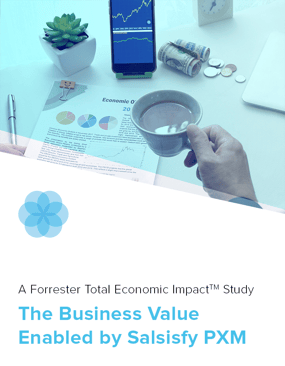Earlier this year Salsify commissioned Forrester Consulting to conduct a Total Economic Impact (TEI) study and examine the potential return on investment companies may realize by deploying Salsify’s Product Experience Management (PXM) platform. The study provides a much-needed framework you can use to evaluate the potential financial impact a technology investment could have on your organization. Brand leaders often ask us what benefits they can expect from their first few years using Salsify. We wanted to provide answers that came from a trusted third-party source that they could share back with their C-Suite and other decision makers in the organization.
Today we’re excited to release the results! The study shows a return on investment of over 300% and a payback period of 7 months. Brand manufacturers now have a document that demonstrates the scale of the opportunity presented by PXM, as well as a model for securing executive backing for the investment.
Figure 1: Financial Summary of Three-Year Benefits from Salsify
How was the TEI study conducted?
The objective of the study is to identify the cost, benefit, flexibility, and risk factors that affect the investment decision. Forrester took a multi-step approach to evaluate the impact that the Salsify PXM platform can have on an organization that included:
- Due Diligence
- Interviews with 5 large enterprise customers
- Composite organization
- Financial Model Framework
- Case Study
The Challenge that led companies to invest in Salsify
Forrester found that prior to using Salsify: “the customers that participated in the study struggled with costly, labor-intensive, suboptimal methods of delivering their digital product content elements’ to retailers’ digital shelves and catalogs. Product Information management (PIM), master data management (MDM), or enterprise resource planning (ERP) systems alone lacked the logic to syndicate or analyze the content without gaps and inaccuracies. These limitations led the five companies in the study to investigate, pilot and invest in Salsify” Specifically the e-commerce and product experience leaders interviewed for this study described the following challenges:
- Content stewardship for eCommerce and digital distribution was labor-intensive
- Content gaps were not visible
- Connections with commerce partners was manual and error-prone
Key Results That Brands Can Expect From Salsify
The results tie the use of Salsify with what every buyer seeks top and bottom line benefits. Specifically, the interviews revealed that key benefits from the Salsify investment include:
Increase in sales and profit.
As one interviewee explained: “We know what accurate content increases sales. Salsify helps us to define how to create content, how to store the content, how to analyze the content, how to publish the content, or connect to systems that help us do that.” -Sr Manager, eCommerce CPG company.
Labor redirected to more productive activity.
The director of product experience for a multinational adhesives producer explains it this way: “Thanks to Salsify we’re allowing our salespeople to go do what they need to do, which is manage relationships and grow sales, not running around our building looking for item-level content.”
Business process support.
Forrester found that employing Salsify allows organizations to rationalize and bring greater discipline to content creation, approval, storage, and syndication processes. A director of eCommerce strategy put it this way: “Salsify is helping us in forcing organizational change and good processes on the marketing teams, so they can spend more time creating content.”
Tag(s):
Written by: Nasry Angel
Recent Posts
Ecommerce Marketing
|
6 minute read
How To Analyze Past Performance and Complete a Marketing Audit for Retail Holidays and Ecommerce Events
Read More
Ecommerce Marketing
|
21 minute read
Eras of Innovation: 5 Ecommerce Marketing Strategies From Beyoncé and Taylor Swift’s Tours To Make Your Sales 'Flawless'
Read More
Ecommerce Technology
|
10 minute read
Ethical AI in Ecommerce: Best Practices for Building Trust and Ensuring Transparency
Read More
Subscribe to the Below the Fold Newsletter
Standing out on the digital shelf starts with access to the latest industry content. Subscribe to Below the Fold, our monthly content newsletter, and join other commerce leaders.



.svg)